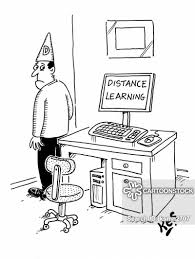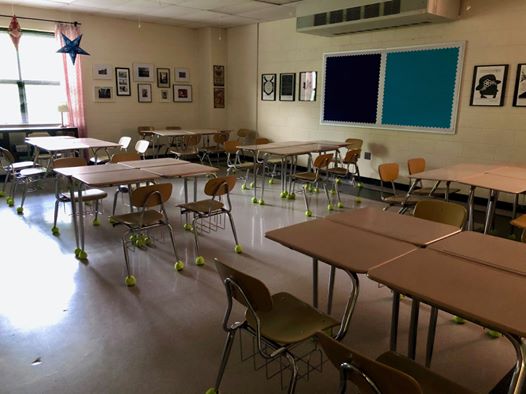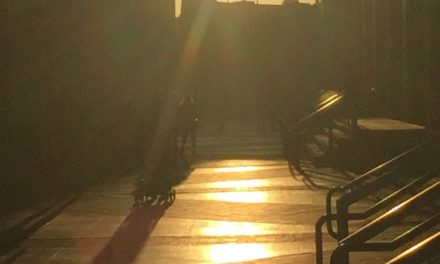It’s spring break, which seems weird as hell, because I haven’t really been at school for a month anyway; and yet, a week without students, even online, is a break. We’ve gone full bore into online teaching for the last month. It’s at least a moment to pause.
Based on what I see from a lot of my colleagues across the country, it seems a place to break the surface and gasp for breath. Each state gives new directives weekly. We try to see how much access to technology our kids have. We struggle with what we can and can’t require. We’re encouraged to engage our students both for their continued education, but also for the ancillary benefits that school provides for children: the socialization, the checks on home conditions, the meals.
More than ever, it should be clear to all of us that school does and always has provided more than just the “reading, writing, and arithmetic.” But some of us as teachers are having a difficult time grappling with this fact (as I procrastinate scoring essays to write this post.) Perhaps nowhere has this been clearer than the ambiguity over grading assignments for class.
For my students, this came last week, as the state of NC provided yet another directive that neither definitively said that we would or wouldn’t take grades for fourth quarter. I don’t really even blame them. And then a week later, as this post is in draft, we make a new announcement, a new directive on grades, and everyone is left to worry frantically why they did all that work in the first place. After another week, the students wonder if they should show up to class at all.
Where this seems to hit the hardest, however, is in the reciprocation of student work. Amidst submitting a final research paper (which they had been working on since the end of January), many of my students openly wondered if the paper would be a grade, and if it wasn’t going to be graded what was the real purpose in doing it in the first place.

Let me put to the side that my high-achieving AP students will all likely matriculate somewhere after high school and will need the skills to use research and cite evidence that I have been teaching them. I actually empathize with this concern. The truth is, I don’t always want to grade their papers, and if I could find a way to teach writing without actually assigning grades, I sure as hell would. But sadly, this is the system in which we work, and grades don’t just mean my evaluation of their effort and intelligence, it also means their status as students, how they represent themselves to universities, how they compare themselves with each other. Grades have come to mean so much, and they mean so much apart from the original intent as a way to evaluate work. They are, in and of themselves, an artificial economy in which the currency is the real goal, not the lessons from the work.
To that end, grades are often seen as a cudgel by which we motivate our students. As much as I like to pat myself on the back because I don’t threaten my students with grades, the truth is, by the time they get to me, it has been so systematically ingrained in them that I don’t really have to. But now, that tool is gone, and students–rightfully so–are wondering to what extent, if any, they should engage in the work when there is no grade on the other side. And as this becomes less and less of a clear answer, attendance in online classes drop, fidelity to work wanes.
Before I go any further, let me at least concede (as with every piece of writing I construct these days) that this is a bougie-ass complaint. I’m really fortunate to have a job that pays me while there are other people struggling to figure out how they’re going to pay their bills or get their next meals. The luxury to be able to contemplate the meaning of my profession as opposed to the more basic questions of existence is one I don’t take lightly. But we all grow where we are planted, and my own struggles are real to me, as I know they are to other teachers out there as well.

Many of us have been frustrated by our inability to teach at the same level we did in live teaching. But perhaps we should all take a step back from this. We must admit that our goals in the classroom are an artifice we create within the structure of school. And now the structure of school, at least temporarily, has changed drastically. That’s not the worst thing for our students. Many of us frequently lament some of the worst outcomes of a school culture that has characteristics still rooted in pre-industrial thinking.
We know it’s not good for them (or us) to wake up that early, to only have 20 minutes to eat lunch, to miss the best parts of each sunny day toiling away inside in artificial environments, to be shuttled from class to class like a product on the old assembly line, the metaphor on which our current high schools are largely based. We know we see our best and brightest consumed by the mental health issues that attend chronic sleep deprivation and anxiety. We see so many intelligent children adopt a latent nihilism rather than buy into that pressure.
We know many of these things are not good for them just as we know that they are not good for us. In school, we are often powerless to change this. A large ship turns slowly, and we are deterministically locked in by variables of class size, budgets, and physical space. For whatever it is worth, we are less bound by those things now. For all the harm it has done, being forced to stay home should give us a pause for how we want life to be, how we can shed the worse of our useless habits. Many of my students are bored, but some of them have started exciting new projects while others have been glad to have a break from the hedonic treadmill, the go go go attitude that makes students think they always have to be doing something, always filling their time with some bauble to put on the student transcript–as evidenced by a student who told me that this is the first time she’s had a break from organized athletic activity in five years.

As for me, I’m often throwing stuff against the wall to see what will stick. Not everything has worked out, but we’ve had some great discussions about the nature of consciousness, the role of comedy and introduction in film. And teo be honest, more than anything, I truly appreciate the human interaction as the most important thing that I miss about my students. In school, it’s easy to forget about them as people, thinking of them as mere receptacles for our brilliant lessons. But remembering our students as humans with their own ambitions and follies is a lesson to constantly relearn.
This week in philosophy class, I started talking to some of my seniors about what their classes are like, and one expressed flatly that he goes to classes when he’s interested or he finds the work valuable (which makes me flattered, I guess). What many of us have noticed is that while there may be fewer students in class, the ones who are there really like to learn. And once I’ve learned to accept that, I realize that I have more of an opportunity to shape my pedagogy into something that students will value beyond the fear of getting poor grades or getting in trouble for not doing the work. Hopefully, there are better ways to engage students than simply threatening them with grades.
The truth is, nobody knows what school is going to look like when the next full academic year starts. It certainly won’t be the old normal, perhaps for reasons that public safety measures will fundamentally alter the physical space. There is much that has been lost by not having that ability to physically meet and organize people. But some of what we have lost we could probably stand to lose. And as we move through this uncertain time, it’s probably best for us not to think about how we can replicate what we had before, but rather imagine things to be better than they were–for all of us.




Recent Comments